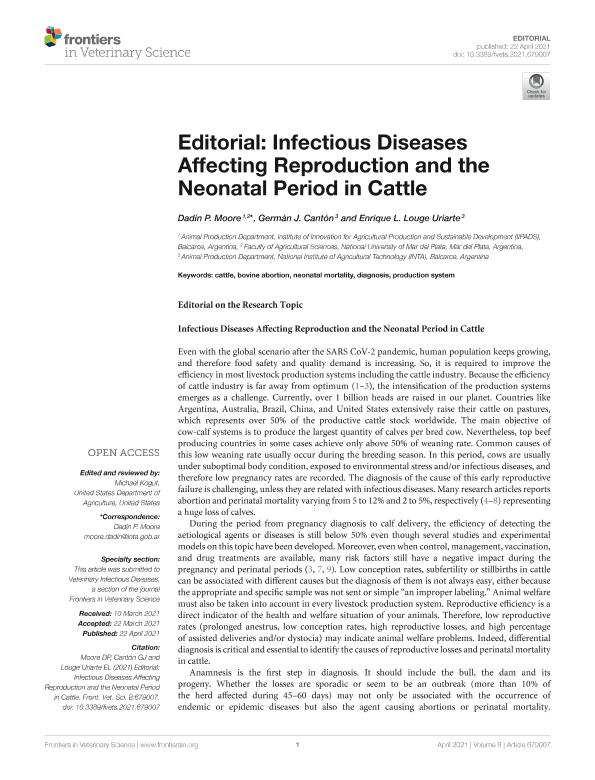Artículo
Editorial: Infectious Diseases Affecting Reproduction and the Neonatal Period in Cattle
Fecha de publicación:
04/2021
Editorial:
Frontiers Media
Revista:
Frontiers in Veterinary Science
e-ISSN:
2297-1769
Idioma:
Inglés
Tipo de recurso:
Artículo publicado
Clasificación temática:
Resumen
Editorial on the Research TopicEven with the global scenario after the SARS CoV-2 pandemic, human population keeps growing, and therefore food safety and quality demand is increasing. So, it is required to improve the efficiency in most livestock production systems including the cattle industry. Because the efficiency of cattle industry is far away from optimum (1?3), the intensification of the production systems emerges as a challenge. Currently, over 1 billion heads are raised in our planet. Countries like Argentina, Australia, Brazil, China, and United States extensively raise their cattle on pastures, which represents over 50% of the productive cattle stock worldwide. The main objective of cow-calf systems is to produce the largest quantity of calves per bred cow. Nevertheless, top beef producing countries in some cases achieve only above 50% of weaning rate. Common causes of this low weaning rate usually occur during the breeding season. In this period, cows are usually under suboptimal body condition, exposed to environmental stress and/or infectious diseases, and therefore low pregnancy rates are recorded. The diagnosis of the cause of this early reproductive failure is challenging, unless they are related with infectious diseases. Many research articles reports abortion and perinatal mortality varying from 5 to 12% and 2 to 5%, respectively (4?8) representing a huge loss of calves. During the period from pregnancy diagnosis to calf delivery, the efficiency of detecting the aetiological agents or diseases is still below 50% even though several studies and experimental models on this topic have been developed.
Palabras clave:
BOVINE ABORTION
,
CATTLE
,
DIAGNOSIS
,
NEONATAL MORTALITY
,
PRODUCTION SYSTEM
Archivos asociados
Licencia
Identificadores
Colecciones
Articulos (IPADS BALCARCE)
Articulos de INSTITUTO DE INNOVACIÓN PARA LA PRODUCCIÓN AGROPECUARIA Y EL DESARROLLO SOSTENIBLE
Articulos de INSTITUTO DE INNOVACIÓN PARA LA PRODUCCIÓN AGROPECUARIA Y EL DESARROLLO SOSTENIBLE
Citación
Moore, Dadin Prando; Cantón, Germán J.; Louge Uriarte, Enrique Leopoldo; Editorial: Infectious Diseases Affecting Reproduction and the Neonatal Period in Cattle; Frontiers Media; Frontiers in Veterinary Science; 8; 679007; 4-2021; 1-3
Compartir
Altmétricas




